Welcome to our blog, dedicated to exploring the rich historical narrative of the Igbo people. As we embark on this journey, we aim to shed light on the significance and impact of the Igbo community within Nigeria and beyond.
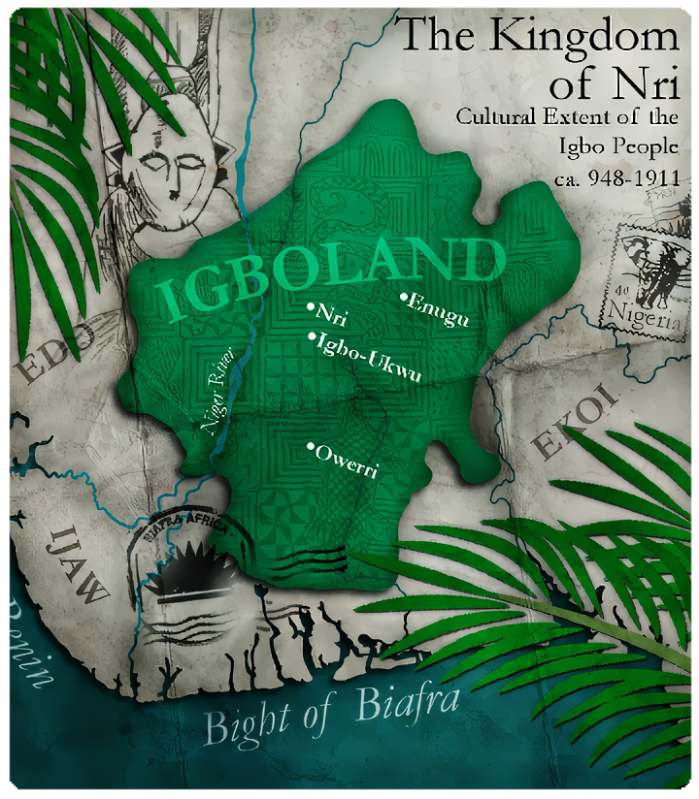
Igboland
The Igbo people are a significant ethnic group in Nigeria and Africa, known for their large population and presence in a region called Igboland. They have a rich cultural heritage that dates back centuries and have played a vital role in shaping Nigeria’s political, economic, and social landscape throughout its history.
One cannot discuss the Igbo people without acknowledging their resilience throughout history. Despite facing immense challenges and adversities, such as the transatlantic slave trade, the Nigerian Civil War, and marginalization, the Igbo community has managed to maintain its unique identity and cultural heritage.
The diversity within the Igbo community is remarkable, with numerous subgroups and dialects that add depth and complexity to their overall narrative. Each subgroup brings its customs, traditions, and perspectives, contributing to the dynamism of Igbo culture.
Through this blog, we endeavor to unearth lesser-known aspects of Igbo history and shed light on the achievements of this remarkable community. We will delve into topics such as the pre-colonial Igbo society, the impact of British colonial rule, the struggle for independence, and the modern challenges faced by the Igbo people.
Origins and Migration of the Igbo People
The origins and migration of the Igbo people have been the subject of much speculation. One theory suggests that the Igbo people originated from an area near the Niger and Benue Rivers, where they shared linguistic ties with neighboring groups such as the Bini, Igala, Yoruba, and Idoma. These communities are believed to have been closely related until five to six thousand years ago.

The Igbo people’s settlement near the Niger and Benue Rivers
According to Igbo folklore, the Igbo people descended from Eri, a divine figure sent from heaven to begin civilization. According to Igbo folklore, Eri had several sons who traveled beyond to establish the present-day Igboland.
Eri, the father of Igbos
Another account presents Eri as one of the sons of Gad, (as mentioned in the book of Genesis chapter 46:16 in the Bible) who traveled down to establish the present-day Igboland.

Eri, the 5th son of Gad, Jacob’s 7th son
Regardless of their origins, the Igbo people have demonstrated an impressive ability to adapt to new environments and integrate with neighboring communities. Throughout their history, the Igbo people have migrated to different regions and established settlements. Today, the majority of Igbo people can be found in southeastern Nigeria, but they are also present in Cameroon, Gabon, and Equatorial Guinea as migrants.
Migration Across Time: Tracing Igbo Settlements
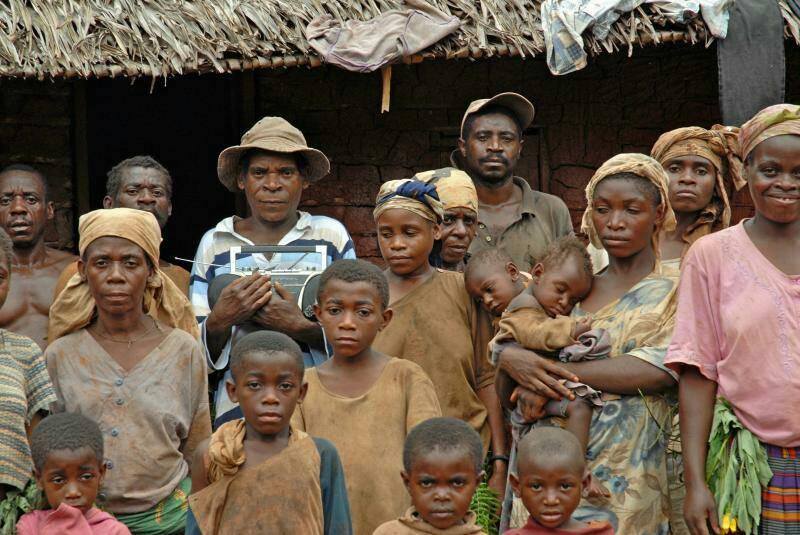
Igbos of Bioko formerly known as Fernando Po Equatorial Guinea
The Igbo people have showcased an impressive capacity to migrate and settle across different regions. Historically, their settlements date back to the 9th century AD in Igboland, situated in southeastern Nigeria. Over the centuries, migrations extended beyond Nigeria, with notable movements to Cameroon, Gabon, Equatorial Guinea, and other parts of West and Central Africa. The Igbo people were actively involved in the transatlantic slave trade, which led to their diaspora in the Americas and the Caribbean. Jamaican culture has been influenced by the Igbo in terms of language, beliefs, and food.
Global Presence: From Africa to the World
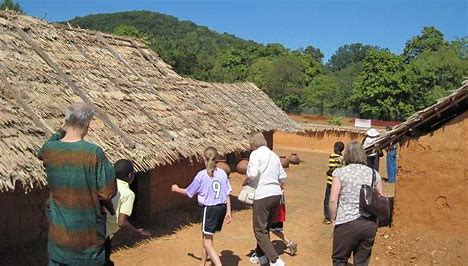
Igbo village in America
In recent times, Igbo migrations have reached even more distant shores, including the United States, Canada, the United Kingdom, and various parts of Europe. Economic opportunities, educational pursuits, and familial connections have been driving forces behind these movements. Noteworthy examples include the thriving Igbo communities in Accra, Ghana, since the early 1900s, and the substantial Igbo presence in Houston, Texas, contributing significantly to the city’s economic and cultural landscape.
Resilience and Adaptability of the Igbo People
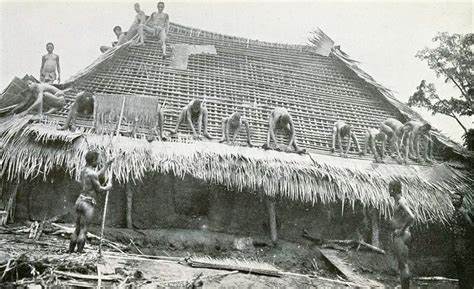
Igbo people build a house together showing resilience and togetherness.
The Igbo people have demonstrated resilience and adaptability in different environments, integrating into local communities while preserving their language and culture. This ability has allowed them to maintain a unique identity and a sense of belonging.
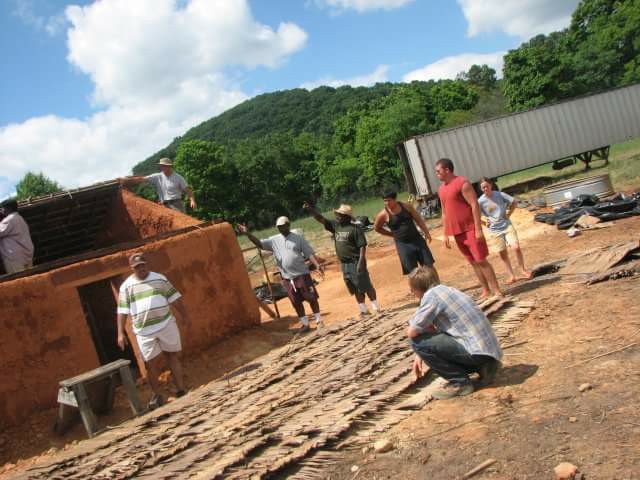
Igbos in Diaspora build mud houses with whites
The origins and migration patterns of the Igbo people have contributed to their rich history as one of the largest ethnic groups in Nigeria. Their ability to integrate with diverse cultures while retaining a unique identity showcases their strength. Exploring traditional beliefs, linguistic ties, and historical events provides insights into the evolution of the Igbo community, highlighting their adaptability both at home and abroad.
Pre-Colonial Era: Kingdoms and Trade:
Nri Kingdom
During the Pre-Colonial Era, several powerful Igbo kingdoms emerged, each with its unique system of governance and cultural practices. One of the most prominent of these kingdoms was Nri, which was situated in what is now known as Anambra State. The Nri kingdom was established around the 9th century and existed until the 20th century when British colonialists succeeded in weakening its power structures. The kingdom was renowned for its religious and spiritual practices, which involved intricate ceremonies and rituals. It was also a significant center of artistic and intellectual exchange, with scholars and artists from across the Igbo region gathering to exchange ideas and express their creativity.
Aro Confederacy
Another notable Igbo kingdom was the Aro confederacy, which emerged in the 17th century and dominated the region until the late 19th century. The Aro people were renowned for their skill in metalworking and used their expertise to establish a flourishing trade network across West Africa. They also exerted significant political and economic influence in the region and were involved in the transatlantic slave trade as middlemen and traders.
Onitsha Kingdom
The Onitsha kingdom was another powerful Igbo kingdom that emerged during this period. Located along the banks of the Niger River, the Onitsha people were renowned for their trading skills and were involved in both regional and long-distance trade networks. They were also skilled artisans and produced a wide range of art objects, including pottery, textiles, and carvings.
These trade routes played a crucial role in connecting various communities and facilitating the exchange of goods, ideas, and technologies. The Igbo’s involvement in long-distance trade contributed to their economic prosperity and allowed them to establish strong connections with neighboring regions, such as Benin and the Hausa states.
Moreover, it is important to acknowledge the controversial aspect of the Igbo’s historical involvement in the transatlantic slave trade. While some Igbo individuals participated in this trade as captors and middlemen, it is essential to recognize that this was not representative of the entire Igbo population. Many Igbo people suffered greatly as victims of the slave trade themselves, enduring the tragic consequences of this dehumanizing institution.
Overall, these ancient Igbo kingdoms were significant centers of political, economic, and cultural life, contributing to the growth and development of the Igbo people and their wider region. Their legacies continue to be felt today, with many aspects of their cultural practices and traditions still evident in contemporary Igbo society.
Impact of Colonialism and Christian Missionaries
The arrival of European colonial powers had a profound impact on the Igbo people, forever altering their political, economic, and cultural landscape. As the scramble for Africa intensified in the late 19th century, European powers, including the British, established a colonial presence in the region. With their presence came a disruption of traditional Igbo systems of governance, as indigenous leaders were often replaced or manipulated to serve colonial interests. The imposition of colonial rule also led to the exploitation of Igbo resources, with raw materials being extracted and exported for the benefit of the colonizers.
The Missionaries
One of the significant changes brought about by colonialism was the introduction of Christianity. Missionaries from Europe arrived and began to spread the teachings of the Christian faith among the Igbo people. This had a profound influence on Igbo culture and religious practices. Many Igbo people adopted Christianity, leading to the decline of certain traditional religious practices and the emergence of new hybrid religious beliefs that blended elements of Christianity with traditional Igbo spiritual beliefs. Churches were established, becoming important centers of community life where education and healthcare services were provided.
The Igbo Resistance
However, not all Igbo people embraced Christianity willingly. Resistance movements against colonial rule emerged, fueled by the desire to maintain autonomy and preserve traditional values. Prominent among these movements was the Ekumeku Movement by the Anioma people in present-day Delta state, which fought against British colonial rule in the late 19th century. Led by Igbo warriors and chiefs, the movement sought to reclaim power and resist the oppression imposed by colonial forces. These resistance movements symbolized the Igbos’ determination to protect their heritage and fight for independence.
The impact of European colonial powers and Christian missionaries on Igbo society was vast and far-reaching. While colonialism disrupted existing systems and exploited resources, it also introduced Christianity, which influenced Igbo culture and religious practices. Nevertheless, the resistance movements against colonial rule highlighted the unwavering spirit of the Igbo people, as they fought to uphold their traditions and strive for independence. The legacy of this period continues to shape the identity and resilience of the Igbo people to this day.
Post-Colonialism: Biafra and the Nigerian Civil War
The Nigerian Civil War, also known as the Biafran War, was a major conflict that had a significant impact on the Igbo People. The war was triggered by a series of political and ethnic tensions that had been brewing in Nigeria since its independence from British colonial rule in 1960. The Igbo people, who were concentrated in the eastern region of the country, felt marginalized and oppressed by the central government, which was dominated by other ethnic groups.
The Nigerian Civil War and the formation of Biafra
In May 1967, the leader of the Eastern Region, Colonel Chukwuemeka Ojukwu, declared the independent state of Biafra, citing the need to protect Igbo interests and sovereignty. This move was met with resistance from the Nigerian government, which sought to maintain the territorial integrity of the country. The ensuing conflict lasted for three years, resulting in significant loss of life and displacement of people on both sides.
The formation of Biafra had a profound impact on the Igbo People. On the one hand, it provided a sense of identity and purpose, as well as a way to resist oppression and marginalization. On the other hand, the war brought immense suffering and hardship to the people of Biafra, who faced starvation, disease, and displacement in large numbers.
End of a Siege
The end of the war in 1970 marked a new phase in Igbo history. The effects of the war lingered on, with many Igbo people struggling to rebuild their lives and communities. However, the resilience of the Igbo people was evident in their determination to rebuild and create a better future for themselves and their children. In the decades since the war, the Igbo people have continued to contribute significantly to Nigeria’s political, economic, and cultural development.
The Nigerian Civil War and the formation of Biafra had a significant impact on the Igbo people, shaping their identity and resilience in the face of adversity. While the war brought immense suffering and hardship, it also inspired a sense of unity and purpose among the Igbo People. Today, the legacy of the war continues to inspire the Igbo people to strive for peace, justice, and prosperity.
The Igbo Cultural Renaissance and Contemporary Times
In post-colonial Nigeria, the Igbo people have experienced a remarkable resurgence of cultural pride. Despite the challenges faced during the colonial era and the Nigerian-Biafran war, the Igbo community has embraced its rich heritage and has taken immense pride in its cultural identity. This resurgence can be seen in various sectors, such as education, business, and politics, where Igbo individuals have made significant contributions.
Igbo Scholars
The Igbo scholars and intellectuals have made significant contributions to the field of education in Nigeria. They have played a crucial role in advancing knowledge and shaping educational institutions in the country. Many renowned individuals like Phillip Emeagwali, P.N. Okeke, Chinua Achebe, and Cyprian Ekwensi from the Igbo community have made remarkable contributions to the development of Nigerian education. Presently, the Igbo States in Nigeria perform better than their counterparts in major Nigerian and international examinations.
Igbo Ventures
The Igbo people are renowned for their achievements in the business sector, both locally within Nigeria and around the world. They are admired for their entrepreneurial spirit and have established thriving businesses across various industries, thereby contributing to the overall economic development of Nigeria. One notable example of their success is the Igbo Apprenticeship System (IAS). The IAS is a communal framework that has been practiced by the Igbos in Africa for centuries, where successful businesses help to develop others by providing capital and passing along their customers to new businesses. The IAS has been considered the best business framework in the world by Professor Ndubuisi Ekekwe, a Nigerian professor of Igbo ethnicity. Harvard Business Review has also approved the work of Professor Ekekwe on the IAS. For decades, the people of southeast Nigeria have adopted the IAS, which Professor Ekekwe argues will help address the problem of growing inequality between the rich and the poor if adopted more widely.
Another pioneering venture by the Igbo people is the Innoson vehicle manufacturing automobile industry, owned by Chief Innocent Chukwuma, the first vehicle manufacturing plant in Nigeria. The plant is located in Uru-Umudim, Nnewi, Chief Chukwuma’s hometown in Anambra state. Many other major stakeholders of Igbo origin have also made significant contributions to the rising economy of Nigeria.
Igbo Politics
The Igbo community has actively participated in politics and has made significant contributions to the political landscape of Nigeria. Igbo politicians have held influential positions and played important roles in shaping policies that affect the country. Their participation in governance has been instrumental in advocating for the rights and interests of the Igbo people and has helped foster inclusivity in Nigerian politics. The current political landscape of Nigeria was impacted by Mr Peter Obi, the presidential candidate of the Labour Party. His emergence to run in the just-concluded February elections changed the political landscape for good, even though the court ruled in favor of the opposing party. Mr. Obi’s ability to motivate young people to engage in political activities helped to disrupt the impending political decay, embodying the courageous and resilient spirit of the Igbo people.
Amidst the progress and achievements in contemporary times, the Igbo people have also made efforts to preserve and celebrate their cultural heritage. Traditional festivals, ceremonies, and practices continue to be observed, showcasing the vibrancy and richness of Igbo traditions. Furthermore, there has been an increased awareness and appreciation of Igbo cultural symbols, language, and art forms. Efforts are being made to ensure that future generations understand and embrace their cultural roots, thus fostering a sense of unity and continuity within the Igbo people.
Challenges Faced By Igbo People
Contemporary challenges faced by the Igbo people include socio-economic disparities, political marginalization, and cultural preservation in a rapidly changing world.
One major challenge for the Igbo community is the issue of socio-economic disparities. Despite their significant contributions to Nigeria’s development, there is often a lack of equitable distribution of resources and opportunities, resulting in unequal access to education, healthcare, and economic opportunities. This disparity can hinder the progress and upward mobility of many Igbo people and communities.
Political marginalization is another challenge that the Igbo people face. Despite being one of the largest ethnic groups in Nigeria, they often feel marginalized and underrepresented in the political landscape. This has limited their ability to influence policy decisions that directly impact their lives and communities, as well as impede their quest for greater political inclusion and representation.
Preserving their cultural heritage is also a pressing challenge for the Igbo people. In an increasingly globalized and modernized world, the younger generation may be more influenced by Western values and less connected to their traditional customs, language, and practices. The risk of cultural dilution or erosion is a concern, as it threatens the richness and uniqueness of Igbo culture.
Furthermore, rapid urbanization and industrialization can lead to the displacement of rural Igbo communities, disrupting their traditional way of life and potentially causing socio-cultural disintegration. As traditional occupations such as farming and craftsmanship are often threatened by modernization, finding ways to preserve and adapt these traditional practices becomes crucial.
Addressing these contemporary challenges requires concerted efforts from both governmental and non-governmental bodies. It involves creating policies that promote equitable socio-economic development, ensuring political representation, supporting cultural education and preservation, and facilitating the integration of traditional practices with modern realities. By acknowledging and addressing these challenges, the Igbo people can continue to thrive while preserving their rich cultural heritage.
In summary, the historical narrative of the Igbo people reveals their resilience, cultural vibrancy, and significant contributions to Nigeria and beyond. Despite facing challenges such as the slave trade and the Nigerian Civil War, the Igbo people have maintained their unique identity and cultural heritage. Their adaptability and resilience are evident in their migrations and integration with diverse cultures while preserving their language and traditions. The pre-colonial era saw the emergence of powerful Igbo kingdoms, and the colonial period brought disruptions but also inspired unity. Post-war, a cultural renaissance showcased the Igbo people’s pride in their heritage. In contemporary times, Igbo individuals excel in education, business, and politics, contributing to Nigeria’s development. It is important to appreciate the complexities of the Igbo people’s historical journey, fostering a deeper understanding of their resilience and the challenges they’ve overcome. Delving into their history, cultural practices, and impact on Nigerian history is encouraged as their story is an ongoing narrative of strength, adaptability, and cultural richness.
Post Disclaimer
The opinions, beliefs and viewpoints expressed by the author and forum participants on this website do not necessarily reflect the opinions, beliefs and viewpoints of Anaedo Online or official policies of the Anaedo Online.

